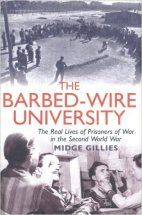The Barbed-Wire University: The Real Lives of Allied Prisoners of War in the Second World War

The Barbed-Wire University: The Real Lives of Allied Prisoners of War in the Second World War - Midge Gillies
Non-Fiction
Pages: 512
Most of what I knew about the lives of POWs during the Second World War I have to say, to my shame, I learned from films like The Great Escape or Bridge Over the River Kwai - which is to say therefore that I knew very little at all. Reading this book was a real eye-opener, particularly in the differences of experiences between those Allied soldiers held captive in Germany and Italy and those in the Far East.
Because the war in Europe was much more immediate for Britain, with the Blitz, bombing raids and threat of invasion - the Nazis have always been demonised far more than the Japanese ever were. It is still true to this day that the war in the Far East was something of a 'forgotten war' and what the POWs in Japan, Thailand, Burma and Singapore went through has never received as much attention as those held in Europe. And yet their experiences were far far worse - the suffering and indignity they experienced, the forced labour, the starvation. The Red Cross never had the infrastructure it had in Europe, so the often live-saving Red Cross parcels rarely got through, and there wasn't the same kind of ability to distribute books, musical instruments, sports equipment and small necessities that were such a highlight to the men held in camps in Germany.
What really fascinates in this book is the sheer inventiveness and ingenuity displayed by the POWs. The hospitals established, complicated medical procedures performed with little or no specialist equipment. Orchestras and bands set up, the plays and musical reviews performed, costumes and sets created out of nothing, the football, rugby and cricket teams, the classes taught, courses studied, languages learned - it is truly amazing at how these man managed to create something out of almost literally nothing. Many learned skills which changed their lives, set them on different careers and paths after they have been liberated. Many were exposed to different cultures, classes and races, men they might never otherwise have met.
I couldn't help but finish them with a really deep and abiding admiration for what this generation of men went through. Keeping one's sanity after, for some, four or more years of captivity would have been an achievement on its own, but, as some did, to take the opportunity to improve oneself, to study and educate with an eye to the future is truly remarkable.